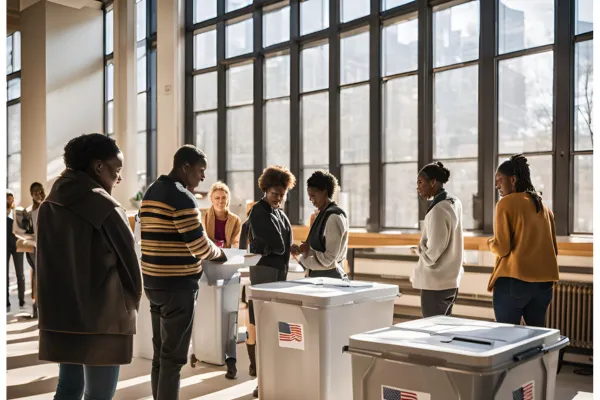Blogs

Navigating the 2024 U.S. Election in the Workplace: A Comprehensive Guide to Voting Leave and Political Discussion Policies
Navigating the 2024 U.S. Election in the Workplace: Employee Rights and Responsibilities
As the 2024 U.S. election draws near, employees across the nation are increasingly aware of their civic duties and the potential impact of this pivotal event on their lives. Understanding your rights and responsibilities regarding voting leave and workplace political discussions is crucial for maintaining a balanced and respectful work environment while exercising your democratic rights. This non-partisan guide aims to provide clarity on these important topics, helping you navigate the election season with confidence and professionalism.
Voting leave is a fundamental right that allows employees to participate in the democratic process without jeopardizing their job security or income. While there is no federal law mandating time off for voting, many states have enacted their own regulations to protect workers' voting rights. For instance, California requires employers to provide up to two hours of paid time off to vote if an employee doesn't have sufficient time outside of working hours to cast their ballot. It's essential to familiarize yourself with your state's specific voting leave laws, as they vary significantly across the country.
To ensure a smooth process for both employees and employers, it's advisable to communicate your intention to take voting leave well in advance. Many companies have established policies that require notice of at least a day or two before Election Day. This allows managers to adjust schedules and workloads accordingly, minimizing disruption to business operations while supporting employee civic engagement.
While voting leave focuses on Election Day itself, workplace political discussions can be a year-round consideration. As the election approaches, these conversations may become more frequent and potentially contentious. It's important to remember that private employers generally have the right to regulate political speech in the workplace to maintain productivity and a harmonious work environment. However, this doesn't mean all political discussion is off-limits.

Many companies adopt policies that allow for respectful political discourse while setting clear boundaries to prevent conflicts or harassment. These policies often emphasize the importance of mutual respect, prohibit the use of company resources for political activities, and discourage managers from pressuring employees about their political views. Familiarizing yourself with your company's specific policy on workplace political discussions can help you navigate these conversations appropriately.
It's worth noting that certain forms of political speech related to workplace conditions may be protected under the National Labor Relations Act. This federal law safeguards employees' rights to discuss work-related issues, including those that may have political implications, such as wages, hours, and working conditions. However, this protection doesn't extend to general political discussions unrelated to employment terms.
As an employee, you can contribute to a positive work environment during election season by practicing empathy and discretion. Recognize that your colleagues may have different political views, and respect their right to privacy regarding their voting choices. If you choose to engage in political discussions, do so in a way that doesn't alienate or offend others. Focus on issues rather than personal attacks, and be open to listening to diverse perspectives.
Employers play a crucial role in fostering an inclusive atmosphere during election season. Many organizations are adopting non-partisan voter education initiatives to encourage civic participation without endorsing specific candidates or parties. These programs often provide information about voter registration, polling locations, and state-specific voting requirements. As an employee, you can take advantage of these resources to stay informed and prepared for the election.
The 2024 U.S. election presents an opportunity for all citizens to engage in the democratic process. By understanding your rights to voting leave and navigating workplace political discussions with tact and respect, you can fulfill your civic duty while maintaining professional relationships. Remember that regardless of political affiliations, fostering a culture of mutual respect and understanding in the workplace benefits everyone. As we approach this significant event, let's commit to balancing our roles as engaged citizens and valued employees, contributing to both a thriving democracy and a positive work environment.
Sources:
U.S. National Labor Relations Board. (2023). Protected Concerted Activity.
Society for Human Resource Management. (2024). https://www.shrm.org/topics-tools/news/employee-relations/political-discussions-workplace

Better Work, Better Life
Support@cagedbirdhr.com
Copyright 2025 Caged Bird HR®., a Worklution Inc Company All Rights Reserved

